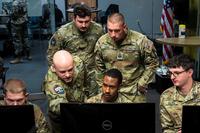Nearly 70 Department of Veterans Affairs nurses rallied in front of the department's Washington, D.C., headquarters Thursday to protest staffing cuts they say are hurting the quality of veterans' medical care.
The nurses, from 23 VA medical facilities across the country, called the expected reduction of 10,000 jobs in the Veterans Health Administration a "hiring freeze." However, VA officials have said the cuts are coming as a result of attrition and retirements and that hiring will continue for short-staffed, critical positions.
National Nurses United, the union that represents more than 15,000 VA nurses, said there are 66,000 vacancies in the VA health care system, including more than 13,000 nursing positions. The vacancies, union officials argue, are eroding the quality of patient care.
Read Next: The European Reenactors Paying Tribute to D-Day Veterans at Normandy
"While the VA denies there is a hiring freeze, nurses live with it every day and every shift, doing more with less, and patient services are suffering," said Irma Westmoreland, a registered nurse at the Charlie Norwood VA Medical Center in Augusta, Georgia, who serves as vice president of National Nurses United.
VA officials announced in March that the VHA needed to trim roughly 2% of its staff this year, following record hiring and retention last year.
They said the reductions would come largely through attrition -- by not filling positions when employees depart or retire -- and likely would affect mainly supervisory and support staff.
At the rally, however, VA nurse Sharda Fornnarino said the cuts have affected "working nurses and patients intensely."
According to Fornnarino, the number of beds in the spinal cord injury unit at the VA medical center in Aurora, Colorado -- the department's newest major medical facility that cost upward of $1 billion to build -- was reduced from 20 to 13.
And the intensive care unit has been reduced from 18 to 12 beds, she noted.
"[This] means these veterans who are the sickest coming into the hospital are getting diverted ... to outlying hospitals, and they're getting delays in their care," Fornnarino said. "Every issue that we've faced over the years [has] gotten worse due to these irresponsible cuts. ... I ask the secretary and our congressional representatives to reinvest in VA."
A VA Office of Inspector General report released last year found that the department had staffing shortages in numerous occupations, with some of the largest shortfalls among nurses.
According to the report, 92% of VA facilities reported severe shortages of nurses.
This fiscal year, the VHA has brought on 15,596 licensed practical nurses and 93,172 registered nurses, according to its Workforce Dashboard, published May 13.
The dashboard does not reveal how many nurses the VA needs to fill out its ranks, however, and says only that the retention rate of licensed practical nurses is 64%, while the rate for registered nurses is 73%.
"We are witnessing vacancies created by nurses leaving our hospitals as going [unadvertised] and therefore this vacant position is going unfilled," Westmoreland said during the rally, referring to the VA deciding not to replace nurses who leave. "When positions go unfilled, does that mean those positions were unnecessary?"
The rally was held in front of the VA's Washington, D.C., Central Office, which houses the offices of VA Secretary Denis McDonough and Dr. Shereef Elnahal, the VA under secretary for health. It is unclear whether they were in the building at the time; they did not attend the rally.
After the rally, Westmoreland said she was disappointed that VA leadership did not speak to the protesters.
"The lady you see there in the blue is from [human resources], so they sent HR people down -- to watch us, not to talk to us. Yes, it is very disappointing," Westmoreland said.
VA officials said that McDonough meets regularly with representatives from National Nurses United and, earlier this week, Deputy Secretary Tanya Bradsher met with Westmoreland.
The union did not request a meeting with McDonough before the protest, but the secretary himself asked for a face-to-face meeting as soon as he learned about the rally and "expects to do so soon," according to an official with knowledge of McDonough's schedule.
In response to questions from Military.com, VA spokesman Terrence Hayes said there is no nationwide hiring freeze for VA nurses, adding that the department is continuing to bring personnel on.
"Over the past three years, VA has aggressively hired nurses nationwide, increasing our nursing workforce by 14,000 nurses to a total of 122,000 nurses," Hayes said in an email. "VA is also retaining our great nurses, with turnover rates currently at 3.4% -- far outperforming the private sector.
"VA's top priority is providing the world-class care that veterans deserve, and we are committed to making sure we have nursing staff we need to deliver the soonest and best care to veterans," Hayes added.
The VA is at a crossroads in terms of providing care to veterans, struggling to balance how to fund VA care and where veterans should receive medical treatment, given an expansion of the department's non-VA care programs in the past five years.
Democrats largely want to strengthen the VA's own medical infrastructure and staff, which they argue are less expensive and provide better care for veterans, while Republicans want the department to focus on providing quality care while also allowing veterans to choose who they want to see, including outside the VA.
McDonough has said the department's community care budget is unsustainable and the department wants to "bring as many vets as possible into VA care."
With concern over rising medical costs, particularly in the private sector, VA leaders convened a team of health care experts from government and industry this past winter to examine community care spending and veterans' access to care.
According to the report published by the "Red Team," the "continued rapid growth of the Veterans Community Care Program" presents VA leadership "with an existential conundrum."
"The increasing numbers of veterans being referred for community care and the VCCP's rapidly rising costs are eroding the VHA's direct care system and having untoward ripple effects on VHA's other missions," the report stated.
The costs, the Red Team added, "threaten funding for and erosion of the VHA direct care system," creating "the unintended consequence of reducing or eliminating choices for high-quality care for the millions of veterans who prefer to use the VA direct care system."
During the rally, the nurses said they are committed to providing quality care within the VA, adding that their patients were the main motivation behind the event.
"We're here because we love the veterans, because we love the VA, because we want it to continue to be the best place to care for our veterans," Westmoreland said.
Related: VA Nurses Protest Staffing Shortages They Say Pose Risks to Patient Safety












